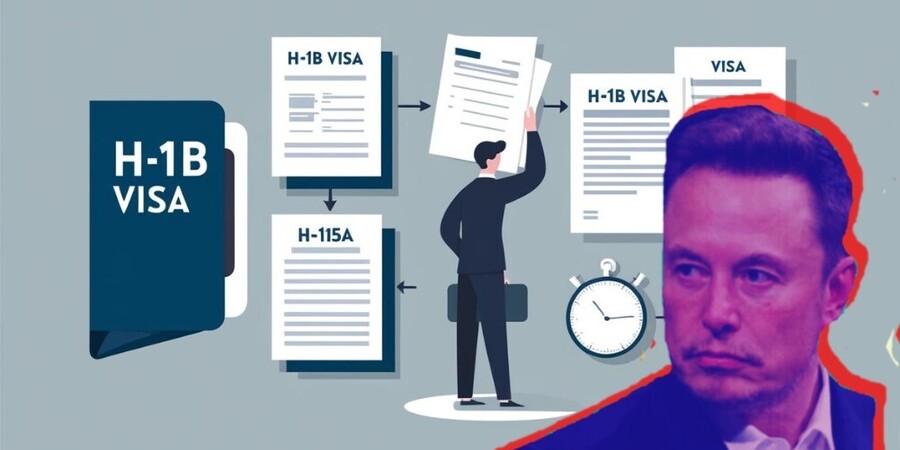In the aftermath of Donald Trump’s historic victory over Kamala Harris, one name looms almost as large as the president-elect himself: Elon Musk. Over the past two years, Musk transformed from a Silicon Valley maverick into an indispensable figure within Trump’s re-election machine. By wielding his X platform to amplify Trump’s message, using his immense wealth to bankroll pro-Trump causes, and crafting a vision of techno-optimism that resonated with parts of the MAGA coalition, Musk played an outsized role in securing the presidency for Trump.
But if Musk’s influence has grown immense, his latest move threatens to jeopardize it. Musk’s outspoken defense of the H-1B visa program—a policy long associated with Silicon Valley’s libertarian elite—has sparked a firestorm of controversy within the MAGA movement. For years, Trump’s base has railed against what they see as the exploitative use of H-1B visas by tech giants to depress wages and displace American workers. Now, Musk’s embrace of this policy risks fracturing a coalition already prone to tension between its populist and libertarian wings.
To understand the stakes, it’s crucial to grasp the specific political currents Musk is navigating. The MAGA base is not merely a coalition of cultural conservatives; it is also animated by a strong undercurrent of economic nationalism. Trump’s 2016 victory was driven, in part, by his ability to speak to blue-collar workers disillusioned by globalization and automation. These voters, who have borne the brunt of offshoring and wage stagnation, are acutely sensitive to policies that seem to favor corporate elites over the American middle class.
The H-1B visa program, for all its merits as a mechanism for attracting global talent, has long been a target of this anger. Critics argue that the program allows corporations to replace domestic workers with cheaper, foreign labor under the guise of filling “skills gaps.” For Musk—a man who has built his career on innovation, but who is also seen as a ruthless capitalist by many—to champion such a policy is a provocation. It reinforces fears that his libertarian instincts and corporate priorities are fundamentally at odds with the populist ethos of Trump’s movement.
Musk might argue that expanding H-1B visas is essential for maintaining American leadership in technology and innovation. He might point to Tesla’s and SpaceX’s achievements as proof of what a globally diverse workforce can accomplish. But this argument is unlikely to mollify MAGA voters, who correctly see such reasoning as an elite justification for policies that prioritize profits over patriotism. Worse, Musk’s advocacy risks creating a narrative that Trump’s second term will be more aligned with Silicon Valley’s interests than with the working-class voters who propelled him back to the White House.
The danger for Musk—and for Trump—is that this rift could grow into a broader rebellion against the libertarian tendencies Musk has started to unfortunately represent. If the MAGA base begins to view Musk as a symbol of the very billionaire class they distrust, they could sour on Trump’s alliance with him altogether. This disillusionment could then create fertile ground for Democrats to reposition themselves as the true champions of economic populism, particularly if they learn from their 2024 defeat.
Imagine a 2028 Democratic Party that abandons its fixation on technocratic liberalism and identity politics, and instead embraces a message of economic nationalism and anti-billionaire populism. Such a party could position itself as the defender of American workers against both corporate elites like Musk and an aging Trumpism seen as compromised by its alignment with Silicon Valley. Figures like Josh Hawley or J.D. Vance within the GOP might try to fill this populist void, but the damage to the broader MAGA coalition could prove fatal in a tight general election.
Musk, for all his brilliance, appears blind to this danger. Like many tech titans, he seems to assume that his personal charisma and accomplishments will allow him to transcend partisan divides. But politics is a more precarious game than engineering. By doubling down on a deeply unpopular libertarian stance, Musk risks alienating a movement that has made him one of its heroes.
For Trump, the lesson is clear: Musk may be an invaluable ally, but his instincts are not always aligned with the interests of the MAGA coalition. For Musk, the lesson is simpler: don’t push your luck. The MAGA movement has already shown its capacity to turn on allies who stray too far from its core principles. If Musk wants to remain a kingmaker in American politics, he would do well to remember that his influence depends on the goodwill of the coalition he risks alienating.
The future of Trumpism—and perhaps of Musk’s own political aspirations—depends on maintaining the delicate balance between populism and libertarianism. In the rush to shape America’s policy landscape, Musk would be wise to step back and consider whether his advocacy for H-1B visas is worth the cost of provoking a rebellion within the very base that brought Trump to power. One that could end up consuming him and his dreams entirely if he isn’t careful.
This Story originally came from humanevents.com

